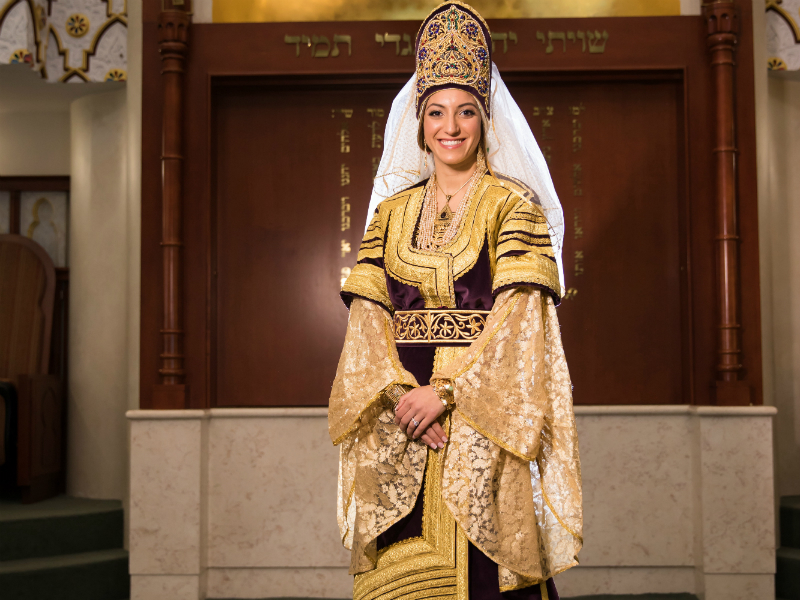Moroccan Jews share a proud and vibrant heritage, with unique rituals and cuisine, particularly when it comes to weddings. Extraordinary bridal dresses, as well as other Moroccan fashions and delicacies, will be celebrated on Oct. 30, when Women Friends of Baycrest invites the community to step back in time and experience a rare glimpse of Sephardic Jewish tradition, fashion and history at the Magical Moroccan Food and Fashions event.
Suzanne Benchimol is an accomplished designer who was born in Meknes, Morocco. She came to Canada in 1964 and has since dedicated her passion to preserving Moroccan Jewish heritage. At this event, Benchimol will address the Jewish life cycle of clothing – from brit milah garments to henna ceremony dresses, wedding gowns and caftans. Highlights of the afternoon fashion show will include original beaded headpieces and Benchimol’s reproduction of an original ceremonial dress from more than a century ago.
In 2007, Benchimol recreated a traditional ceremonial berberisca dress, whose origins date back 200 years. “I made the dress in four colours: red, burgundy, green and aubergine.”
Baycrest leadership gifts director Ian Leventhal explained, “Suzanne interprets them personally. She’s not showing us antiques and she’s not showing us things that have been used before. She is reinterpreting thematically these ceremonial dresses.”
Until about a century ago, Jewish brides in Morocco wore such dresses. Now, no longer considered bridal gowns, these ceremonial dresses are worn before the wedding in a ceremony called the “henna night.” On the night after the bride has gone to the mikveh (ritual bath), she dons the ceremonial velvet dress, rich in tone, embroidered with gold thread and adorned with pearls and other jewels. An ornate crown is worn beneath a white veil.
“In the Sephardic tradition, the henna night represents a very important custom in the married life of a Jewish woman,” said Benchimol. “In 1912, the French came to Morocco and Morocco became a colony. That’s when we started using (the ceremonial dress) for a henna night. The same ceremony done 100 years ago is still carried out today in Toronto. The whole idea is to preserve the ceremonial dress that has become so rare.
“Often the dress is a family heirloom. The bride is brought into the main room by her parents and future in-laws. All the guests congregate around the bride and sing a traditional song in her honour, and lit candles are carried by a close friend or relative who walks at the head of the procession – the candles were used to illuminate her way to her new home. Henna dye is placed on the bride’s palm as well as on those of unmarried women, symbolizing fertility and protection.”
Moroccan Jewry has a diverse and layered past. Morocco’s Jewish population exceeded 250,000 before the Second World War. By the 1960s, emigration to Israel and other countries, including Canada, reduced the population. According to the World Jewish Congress, the largest Moroccan Jewish community today is in Casablanca, which is home to 1,000 Jews. There are several smaller Jewish communities in Rabat, Marrakech, Meknes, Tangier and Fez.
READ: SINGER CHANNELS ‘AGGRESSIVE POSITIVITY’ ON NEW ALBUM
Rabbi Geoffrey Haber, Baycrest’s director of spiritual care, will share insights about Jewish diversity resulting from migration. “At the event, I will talk about the first diaspora communities in Babylonia, Egypt and Rome, and also the development of Ashkenazi, Sephardi and Mizrahi Jewish communities and how they came to be,” said Rabbi Haber. “At Baycrest, we have Jews from all over the world, and while the preponderance tends to be Ashkenazi Jews, we do have a number of Sephardi Jews and Jews of unique communities that don’t identify as Ashkenazi, Sephardi or Mizrahi – Jews such as Roman Jews and Yemenite Jews. I’ll discuss those communities as well.”
The idea of the Magical Moroccan Food and Fashions event is to celebrate Jewish diversity at Baycrest, added Leventhal. The funds raised will sustain and enhance Baycrest’s arts programs.
Women Friends of Baycrest co-chairs Tobie Bekhor and Gilda Goodman Helman said attendees should “prepare for a fashion show unlike any you have seen before, with a stunning array of colourful and sumptuous dresses and caftans. There will be delicious Moroccan cakes and sweets as you learn about the traditions surrounding these magnificent garments.”
The event will be held at a private residence in Toronto. RSVP to Melissa Sobel: 416-785-2500 ext. 6288.
